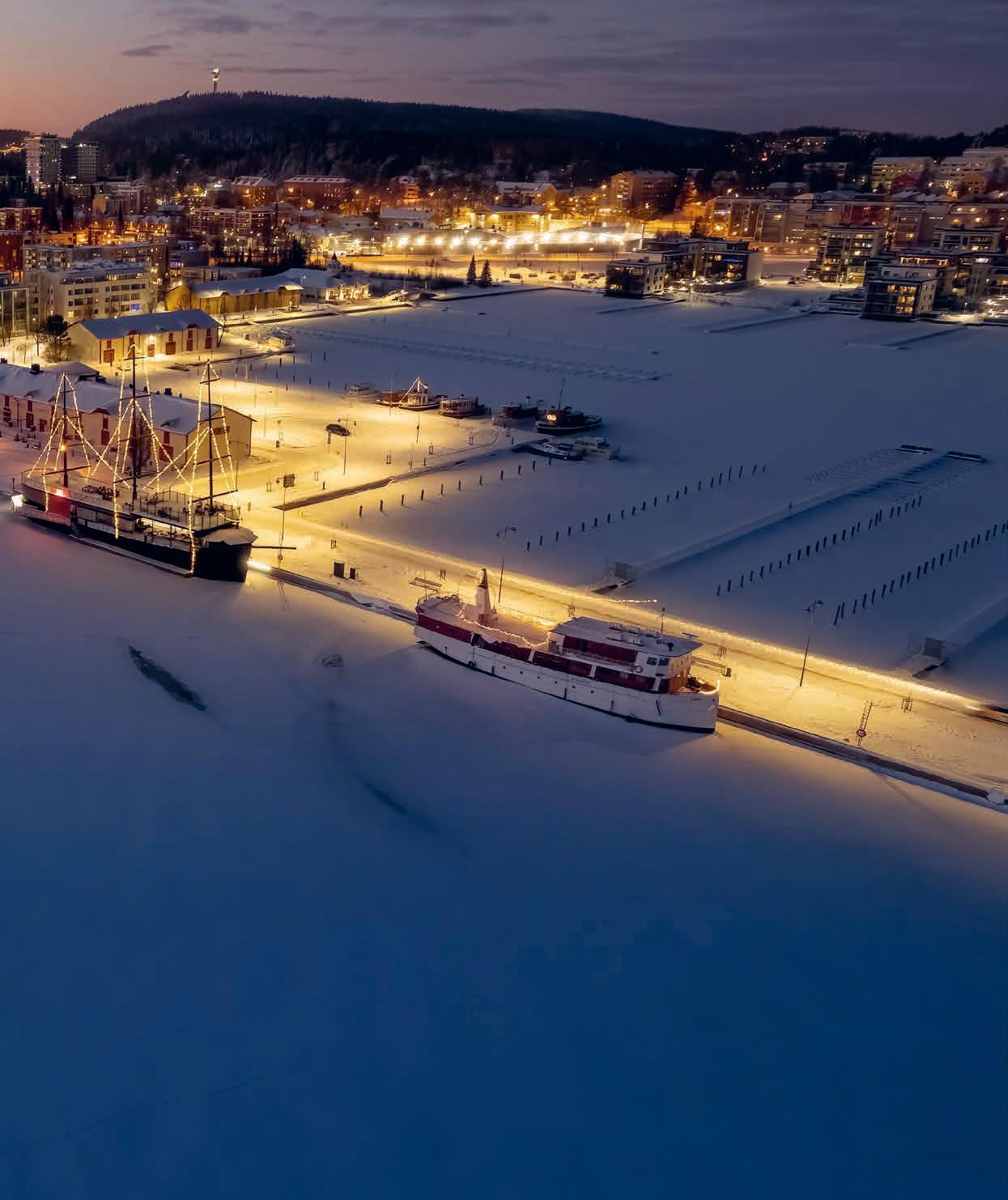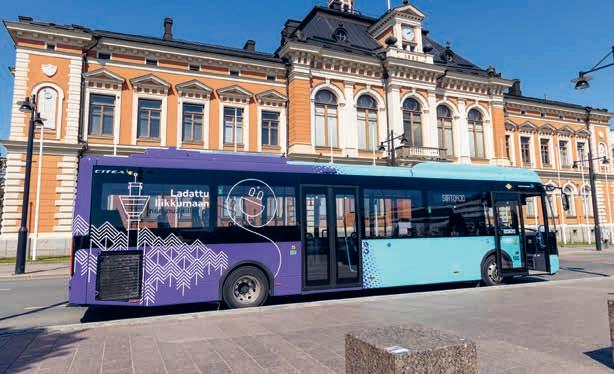
4 minute read
Open, Inspiring Climate Action with and for Residents
The City of Kuopio is a forerunner in smart mobility and in collaborating on behalf of climate-smart solutions. Kuopio is one of the first to invest in electric traffic and is currently launching an international cooperation project to address the challenges of extreme weather events.
TEXT MINNA AKIOLA | PHOTOS KUOPIO-TAHKO MARKKINOINTI, WILLE MARKKANEN, SANNA PIETIKÄINEN AND VICENTE SERRA
The vision of the City of Kuopio for 2030 is to use as much renewable energy as possible and to bring energy consumption down to a sustainable level. The goal is to create an urban structure that supports carbon neutrality and smart mobility, the environmentally friendly production and consumption of food and resource-wise consumption.
In the upcoming years, Kuopio will invest in the transition to renewable energy, such as solar electricity and district cooling. In addition, the carbon footprint of construction will be reduced by increasing wood construction and the use of recycled materials. For example, the ongoing street construction project in the district of Savilahti has used crushed concrete and power plant ash. The various circular economy and resource-wise solutions also provide significant new business opportunities for many companies.
SMART MOBILITY IS AN OVERARCHING THEME IN KUOPIO

Kuopio is one of the forerunners in introducing electric traffic. It was the fourth city in Finland to launch electric buses in the summer of 2021. The city already had 13 biodiesel buses which had been introduced earlier. About 80 percent of the local public transport now runs on clean energy.
According to Public Transport Manager Kaisu Matinniemi, the energy solution of the Kuopio urban area was guided by the Clean Vehicles Directive of the EU, which requires a certain share of clean vehicles, including electric buses, in the procurement of local transport services. The rest can run on biodiesel or biogas. Clean public transport is expected to increase the use of public transport and the attractiveness of the entire urban area.
When speaking about Kuopio being climate smart, you cannot forget the Vilkku city bikes – the first electric city bikes in the Nordic countries. According to Mayor of Kuopio Jarmo Pirhonen, smart mobility has been one of the key focus areas of the city for years. In addition to

« When speaking about Kuopio being climate smart, you cannot forget the Vilkku city bikes.
Kuopio is one of the forerunners in introducing « electric traffic. Electric buses were launches in the summer of 2021.

electric traffic, Kuopio is investing in the charging network for residents’ own electric vehicles and biogas filling stations.
“Smart mobility is an overarching theme that covers public transport, parking, electric city bikes and pedestrian and bicycle routes. Smart mobility is not only a climate action, but also an action on behalf of the urban environment and health,” says Pirhonen.
INTERNATIONAL COOPERATION FOR CLIMATE SMART SOLUTIONS
The City of Kuopio has joined forces with its twin city, Bodø in Norway, to apply for funding from the NPA Programme (Northern Periphery and Arctic). The application also includes Ireland (Central Solutions Ltd as a partner) and Scotland (Heriot-Watt University as a partner). The appli-
cation was prepared by the Savonia University of Applied Sciences, one of the key players of the Kuopio Water Cluster, which focuses on research, devel"Together we can make opment and innovation in the water sector. a good future for both Funding was also applied for SWATCH (Smart Water Manmunicipalities." agement Against the Threats of Climate Change), a project aiming to address the challenges of extreme weather events, particularly heavier rainfall and the resulting flooding. Bodø had an idea to use AI to predict the future using sensor technology and to build a model for water and wastewater management for a digital twin. The idea received a positive response from Kuopio and Savonia UAS. “We started to discuss this together and develop the bridging call project with this theme. We then found new partners in Ireland and Scotland. It has been a great team so far and we in Bodø are

very much looking forward to this cooperation. We really hope that we will get the funding for the project,” says Project Developer, Adviser Trond Åmo from Bodø’s Office of City Development.
According to Chief Innovation Officer at the City of Kuopio Arto Holopainen, this is a consortium application procedure so the project requires the expertise of multiple parties. That is why Ireland and Scotland are involved, as they have plenty of experience living at the mercy of heavy rains.
Holopainen is happy to see concrete cooperation springing up between the twin cities. The cities will develop the joint project from their own standpoints, aiming to do some good for their residents. Åmo agrees.
“We want to develop the friendship, see what we can learn from each other and seek new knowledge. Together we can make a good future for both municipalities,” says Åmo.
Holopainen adds that the cities of Kuopio and Bodø will serve as development platforms for the project. Technology will be developed in practice in actual urban environments, instead of laboratory conditions where such research is typically done.
According to Åmo, the changing climate will affect the life of ordinary residents quite dramatically if Kuopio and Bodø do not prepare themselves for it. They need to obtain more knowledge on how climate change will affect the cities locally and to use new knowledge and technology to make new area plans.
“We must change our behaviour and become “greener” in our life to hopefully reduce the impact. If we do nothing, we may suffer badly both in terms of the economy and the environment,” says Åmo.










